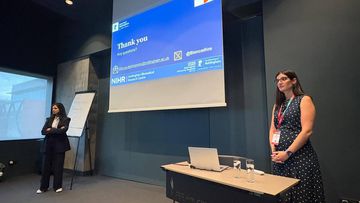World MS day: Connecting and collaborating to maximise resource
News
This World MS Day is, for the third and final year, focusing on connection. We want to encourage connection with colleagues, and with your patients themselves, as a way to get the best possible outcomes for people affected by MS.
Connecting with colleagues : collaborative care
Here are some examples of how healthcare professionals around the country have connected with their colleagues to create informal pathways or collaborative service models. Rather than create a whole new service or pathway, we can make best use of existing resources, share expertise, be strategic about who does what, and link into existing pathways.
Make best use of existing resources
We know that getting a new service developed from scratch is incredibly hard work - but what about creating something new by using existing services from different departments in a novel way, or for a new group of patients?
Two different collaborative services, one catering for people with MS looking to start a family or during their pregnancy, and another to support people with MS experiencing bladder problems, created new pathways into existing services and used collaboration, including shared records and joint clinics. This provides a new service to meet an otherwise unmet need - without developing a service from scratch.
Find out more about the twice award-winning MS and maternal medicine service based in Sheffield, thought to be the only one of its kind in the UK currently, and the origins of a joint urology and MS clinic established back in 2014 in recognition of a significant need for better bladder management in MS - something now being recognised at a national level.
Be strategic about who does what
Services look different everywhere, are formed of a variety of different roles, and are catering for a different population, which means there's no one solution to what a strategic approach looks like.
However, looking at your own MS populations' needs, identifying different skillsets and abilities within your team and having an agreed approach to how to use those skills to best meet your populations' needs can help get the best use of time and resource, play to everyone's strengths, and achieve the best outcomes.
On International Nurses Day earlier this month we spoke to MS specialist nurse Sarah Roderick who explained how her small team of two have done just this. She also shared their framework in case other teams can use it.
Share expertise
At every course or event we run, we hear speakers and delegates alike share how valuable they find chatting with their peers and hearing their experiences of managing different challenges, or meeting needs. That's why we have a space on our website dedicated to sharing all of your workplace projects - so others can learn from your experiences.
Last year, we published a report featuring ten very different examples of how individuals around the country had worked to improve outcomes for their patients - many of those examples highlight the importance of collaborating locally, and of educating and supporting peers. You can find our Education with impact report here nestled amongst 147 other projects specifically in MS - or why not see if learning captured for other conditions could be useful for you too? There are over 400 to choose from…
Small changes towards collaboration - and learning from other conditions:
Here are a few examples of simple changes that might make a big difference, gathered from the experiences of other healthcare professionals across the country.
Where an MS coordinator is in post, this can have a huge impact, but where this isn't possible, a shared team email could help manage email traffic, aid team communication and ensure prompt responses to patients.
- Consider standardised paperwork to take the extra planning out of the day and literally put everyone on the same page.
- Proformas can make sure all the relevant information is available in a standardised way to everyone who needs it, such as registrar Mark Maskery implemented in streamlining his local disease-modifying therapy MDT clinic.
- A discharge list like occupational therapist Victor Ike developed can ease discharge management, make sure patients have the community support they need and reduce likelihood of readmittance.
- Talk to your pharmacist teams to find out if the current electronic record system could be used to monitor people with Parkinson's medication access on hospital wards to allow for proactive work and reduce the chance of adverse effects from non-timely access, like specialist nurse Nick Bryden.
Related articles
Encouraging excellence, developing leaders, inspiring change
MS Academy was established in 2016 and in that time has accomplished a huge amount with exciting feedback demonstrating delegates feel inspired and energised along their personal and service development journeys. The various different levels of specialist MS training we offer are dedicated to case-based learning and practical application of cutting edge research.


